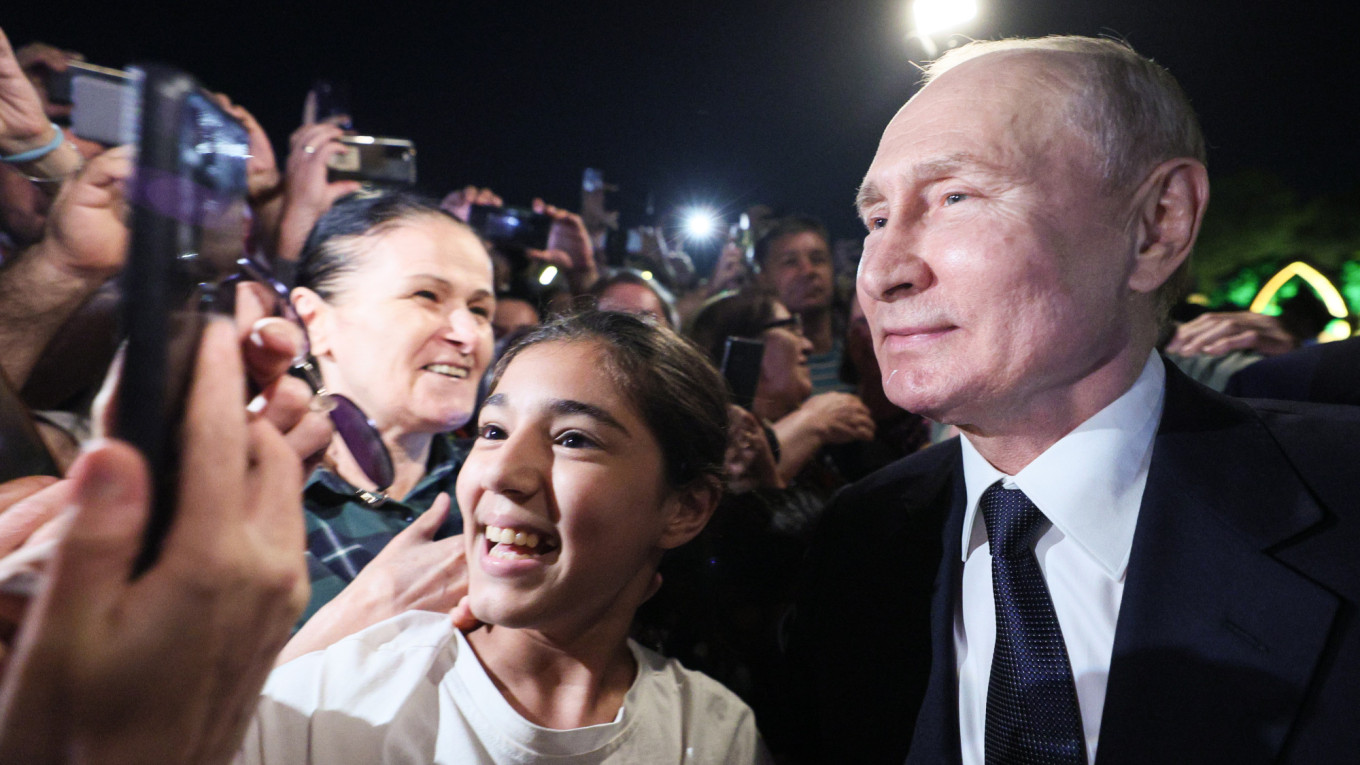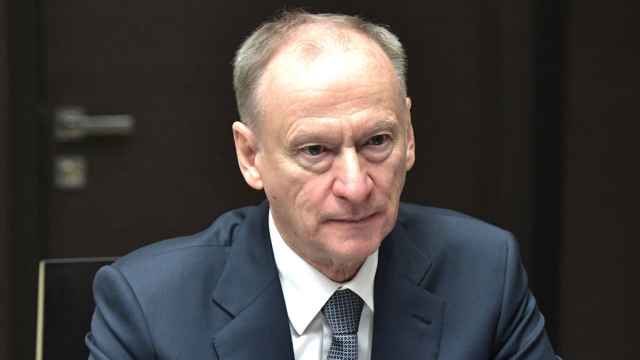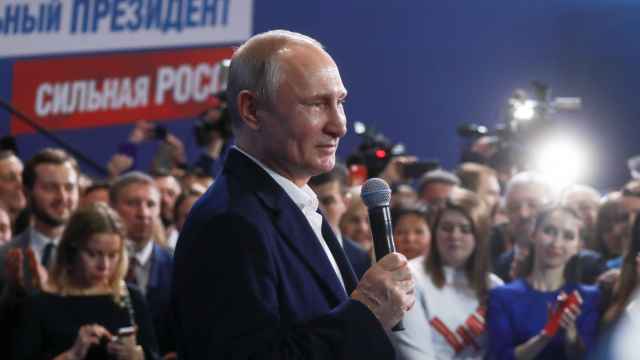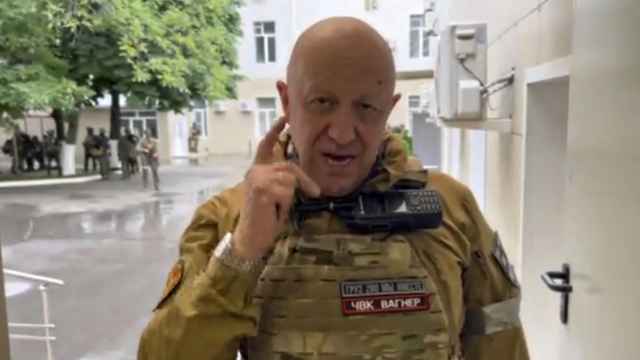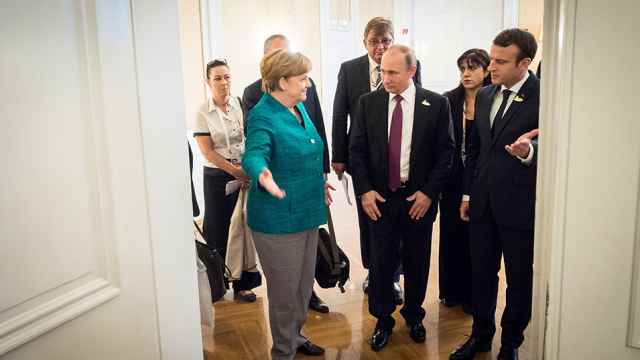The Kremlin has ordered a major PR damage control effort in the five days since armed Russian mercenaries seized a southern city and came within 200 kilometers of the capital with barely any resistance, Russian officials told The Moscow Times.
Wagner mercenary group leader Yevgeny Prigozhin’s shock rebellion against the country’s military leadership sparked Russia’s most serious security crisis in decades — and saw scenes of civilians cheering for Wagner troops in Rostov-on-Don.
On the eve of Putin's widely expected announcement that he will run for re-election, the Kremlin is seeking to convince the nation that nothing significant happened — and that Putin’s rule is unshaken.
In the days since the mutiny was called off, President Vladimir Putin has eschewed his strict, long-held quarantine mandate to hug and take selfies with the public in the streets of the republic of Dagestan.
He insisted that the mutineers did not galvanize support from the public and that the country's military and security services united to stop a “civil war.”
The Kremlin has also claimed that Putin enjoys the support of the whole nation and said that he has not been weakened by the rebellion.
For the Kremlin, the aborted mutiny has exposed several critical problems which demand urgent attention. Of these, the task of saving Putin's image as a figure who is supported by the nation was ordered to be dealt with immediately, a source close to the Kremlin told The Moscow Times.
A Russian official who agreed to speak on condition of anonymity confirmed this.
“When Prigozhin's troops easily took Rostov-on-Don and nearly made it to Moscow with no resistance, it created the image that no one stood up for the chief [Putin]. This contradicts the image of the nationally beloved leader," the Russian official said.
Kremlin officials, particularly its political curator Sergei Kiriyenko, started scheduling a series of events to bolster Putin’s image after being ordered “to counter this PR disaster and to come up with something urgently to vividly demonstrate Russians' love for Putin,” said a source close to the Kremlin who is familiar with the events’ organization.
“The meetings with security forces in the Kremlin were to show that the army and special services are with Putin. Talking to people on the street in Derbent [Dagestan] — all of them, of course, were not random passersby, they were all gathered on command by officials and made to wait six or seven hours for Putin to come out to them — should show a picture of the people's love for him," the source continued.
In parallel with solving the PR disaster in the wake of the mutiny, the Putin regime needs to deal with the rebellion’s causes to ensure it never happens again — all as the next presidential election is just eight months away.
Prigozhin and his mercenaries agreed to decamp to neighboring Belarus, where construction of field camps to house them is already underway, in exchange for criminal immunity.
But the fact that the regime didn’t see Prigozhin’s rebellion coming indicates that it is not adequately immersed in the world of Russia’s private military groups to do so, according to Alexander Gabuev, director of the Carnegie Russia Eurasia Center in Berlin.
“The fact that American intelligence knew about this better and earlier than the FSB says something about the effectiveness of the FSB, at least at this point,” Gabuev told The Moscow Times.
The regime Putin created has many weaknesses, as this episode has shown, but it particularly suffers from poor communication of information inside the system and problems with distribution of responsibility, said Oleg Ignatov, a senior analyst at the International Crisis Group.
“It's not clear who is responsible for what. Everyone thought that it was Putin himself who was behind Prigozhin. The presidential administration did not interfere. The FSB turned a blind eye because they don't like the army. Everybody thought somebody was controlling him, but not them. But as a result, it turned out that no one was. And at the moment of crisis there is a situation of paralysis,” Ignatov said.
This was echoed by a Russian government official who agreed to speak to The Moscow Times on condition of anonymity.
“The system completely failed. Middle- and upper-level [officials] who didn't understand what was going on simply ran away. The security and law enforcement agencies were given orders to nearly blow up bridges. Shoigu ran away somewhere. And this is not a staging, this is a real thing," the government official said.
Another problem is determining whether Prigozhin acted on his own or had associates within the military and civilian power structures.
Pro-war military bloggers, as well as the Russian and Western media, reported Wednesday and Thursday that the security services detained General Sergei Surovikin, the ex-commander of Russia’s forces in Ukraine and a figure seen as close to Prigozhin. The Defense Ministry has not yet commented on these reports.
“Most troubling for Putin will be to figure out just how far Prigozhin and his ‘roof’ may have risen within the regime itself. The apparent silence of some senior figures during the crisis means that some kind of purges are likely — even if they happen quietly and at a later date," Matthew Rojansky, CEO of the U.S. Russia Foundation and distinguished fellow of the Wilson Center's Kennan Institute, told The Moscow Times.
Putin likely understands at least in part the scale of the problems in the military and security services that have become so apparent since the full-scale invasion of Ukraine. However, he cannot initiate a serious reshuffle given that Russia is in a state of heavy warfare, said Yevgeny Roshchin, a researcher at Princeton University.
“Right now Putin is trapped by circumstances because it's very dangerous to use open repression against the troops or against intelligence in wartime,” Roshchin said. “Because tomorrow a new Prigozhin may appear. And he will already know how to act in this environment. That is, the lesson has been learned, and it is unlikely that the new Prigozhin will stop halfway. The next one will know that it will be necessary to use weapons and remove the dictator.”
From the average Russian’s point of view, the incident has also marked the beginning of the destruction of many myths about the sacred nature of the Kremlin, the omnipresence of the siloviki and patriotic unity, said Russian political analyst Ekaterina Kurbangaleeva.
But although what happened has dealt a heavy blow to the system, Gabuev said it also gives the system an inoculation against turmoil, which Putin can use to strengthen his grip.
A Message from The Moscow Times:
Dear readers,
We are facing unprecedented challenges. Russia's Prosecutor General's Office has designated The Moscow Times as an "undesirable" organization, criminalizing our work and putting our staff at risk of prosecution. This follows our earlier unjust labeling as a "foreign agent."
These actions are direct attempts to silence independent journalism in Russia. The authorities claim our work "discredits the decisions of the Russian leadership." We see things differently: we strive to provide accurate, unbiased reporting on Russia.
We, the journalists of The Moscow Times, refuse to be silenced. But to continue our work, we need your help.
Your support, no matter how small, makes a world of difference. If you can, please support us monthly starting from just $2. It's quick to set up, and every contribution makes a significant impact.
By supporting The Moscow Times, you're defending open, independent journalism in the face of repression. Thank you for standing with us.
Remind me later.



